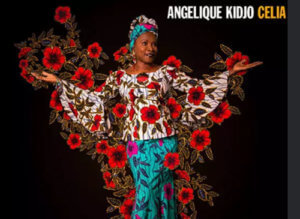Co-authored by Emilia Intili and Courtney Gosse.
The Institute for Global Understanding (IGU) co-hosted the inaugural Tuesday Night World Music Record Club on Angelique Kidjo’s album, Celia, on October 20 at 7:30 p.m. This event was moderated by Dr. Meghan Hynson, Assistant Professor of Ethnomusicology in the Department of Music and Theatre Arts at Monmouth University. Joining Dr. Hynson was a special guest co-moderator, Dr. León García Corona, Assistant Professor of Ethnomusicology at Northern Arizona University, specializing in Latin American Music and Music and Sentimentalism in Mexico.
The album, Celia, by Angelique Kidjo was a consensus pick due in part to Kidjo’s recognition as  the recipient of the 2020 Grammy Award for World Music. Time Magazine has called her “Africa’s Premier Diva.” Angelique Kidjo is a French-Beninese singer, songwriter, actress, and activist who travels around the world advocating for women and children as a goodwill Ambassador for UNICEF and OXFAM. Kidjo advocates for women entrepreneurs to help close the financial gap in Africa and has created a charitable foundation, Batonga, which supports the education of girls in Africa. She has always respected and idolized Celia Cruz due to Cruz’s proud African roots. Kidjo’s tribute album to the Cuban “queen of salsa,” Celia Cruz, showcases how Kidjo Africanizes Cruz’s Afro-Cuban and Afro-Caribbean style. Kidjo cross-pollinates her West African traditions with Latin American influences such as merengue, rumba, and cha cha cha.
the recipient of the 2020 Grammy Award for World Music. Time Magazine has called her “Africa’s Premier Diva.” Angelique Kidjo is a French-Beninese singer, songwriter, actress, and activist who travels around the world advocating for women and children as a goodwill Ambassador for UNICEF and OXFAM. Kidjo advocates for women entrepreneurs to help close the financial gap in Africa and has created a charitable foundation, Batonga, which supports the education of girls in Africa. She has always respected and idolized Celia Cruz due to Cruz’s proud African roots. Kidjo’s tribute album to the Cuban “queen of salsa,” Celia Cruz, showcases how Kidjo Africanizes Cruz’s Afro-Cuban and Afro-Caribbean style. Kidjo cross-pollinates her West African traditions with Latin American influences such as merengue, rumba, and cha cha cha.
Seven songs reinterpreted by Kidjo from Cruz’s work of the 1950s were discussed during the session: “Cucula,” “La Vida Es Un Carnival,” “Sahara,” “Baila Yemaya,” “Toro Mata,” “Quimbara,” and “Bemba Colora.”
- “Cucula” is a classic ode to the joy of dancing. Dr. Hynson emphasized the use of Cruz’s tagline “Azucar” throughout the song.
- “La Vida Es Un Carnival” represents the creation of the popular musical genre salsa.
- “Sahara” depicts the landscapes of North Africa and invokes the Middle Eastern style music that is present within this region.
- “Baila Yemaya” refers to the Yemaya Orisha (“the mother of water” and “the protector of children and women”) and directly connects the African heritage these two singers share.
- “Toro Mata” (“The Bull Kills”) alludes to colonialism and the transatlantic slave trade.
- “Quimbara” denotes the unique juxtaposition that Cruz and Kidjo portrayed.
- “Bemba Colora” references issues surrounding racism. The title, meaning “red mouth,” represents being of African descent and its significance to being voiceless in society.
Dr. Hynson stated that the purpose behind the World Music Record Club is to listen, learn, and delve into the reality behind musical genres and their connection to complex societal issues with which we may not be familiar. Through the events in this new series, she noted that we can increase our knowledge about what’s happening musically by sharing musical and cultural influences historically and transnationally. This event fulfilled those cross-cultural appreciation and education objectives and was an outstanding debut for this exciting new series.
